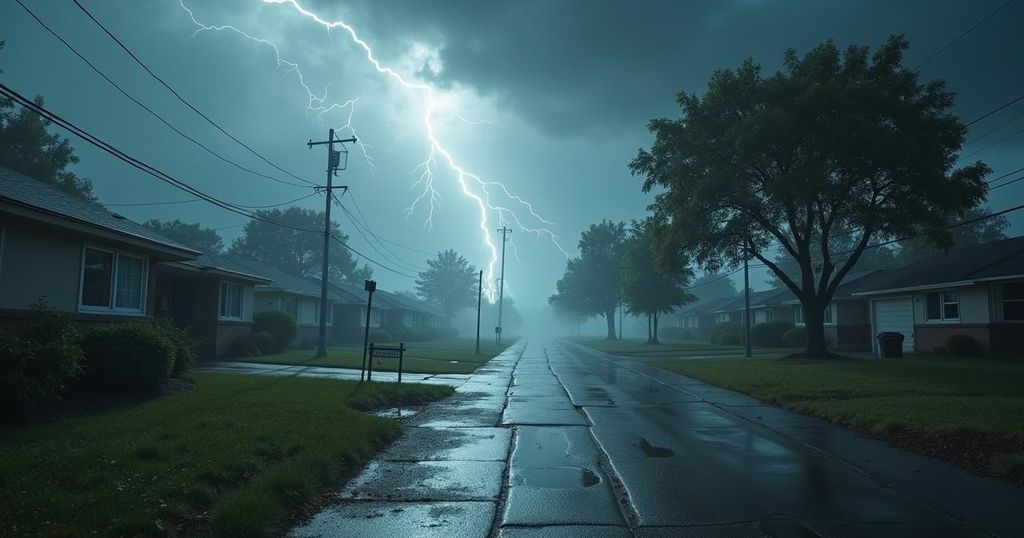The article discusses the recent hurricanes Milton and Helene as indicators of climate change, arguing that these events highlight the need to redefine national security to include climate and public health threats. It reviews historical shifts in the understanding of national security, emphasizing the necessity for proactive policy adaptations to address current and future challenges.
The recent devastation wrought by Hurricanes Milton and Helene has starkly highlighted the grave implications of climate change as a national security threat, surpassing traditional adversaries such as terrorism and authoritarian regimes. Hurricane Milton has particularly impacted Florida, with experts attributing the increased intensity of such storms to the rapidly warming oceans. Meanwhile, Hurricane Helene, which struck North Carolina, resulted in significant loss of life, claiming at least 232 victims while affecting areas previously thought to be insulated from climate-related hazards. Acknowledging climate change as a core national security concern aligns with pragmatic realism rather than a partisan viewpoint. The U.S. Department of Defense has recognized climate change’s threat potential, incorporating it into its national security framework. U.S. Secretary of Defense Lloyd Austin has categorically stated, “We face all kinds of threats in our line of work, but few of them truly deserve to be called existential. The climate crisis does.” The implications of climate change extend beyond natural disasters; climate-induced displacement is generating a wave of climate refugees, exacerbating global conflicts. An example of this dynamic can be observed in Sudan, where ongoing conflicts are intensified by the influx of displaced populations seeking safety and stability. Historically, the concept of national security has evolved. President Franklin D. Roosevelt articulated a broader definition, emphasizing citizens’ right to security from economic hardship, thereby framing national security as encompassing the well-being of all Americans. In his 1941 State of the Union address, he championed the imperative for “freedom from want.” However, the Cold War shifted the focus towards a narrower stance on national security, prioritizing defense against external militaristic threats. Following the September 11 attacks, the understanding of national security further solidified around combating terrorism. As articulated in the George W. Bush administration’s 2002 national security strategy, “Defending our Nation against its enemies is the first and fundamental commitment of the Federal Government.” Currently, re-evaluating the definition of national security is paramount, particularly in light of concurrent global crises such as climate change and pandemics. The Covid-19 pandemic alone has resulted in approximately 1.2 million American deaths, a toll comparable to casualties from all U.S. wars since the American Revolution. This reality raises critical questions regarding America’s preparedness for future pandemics, and political leaders are increasingly pressured to establish robust frameworks for public health safety, particularly with the current inadequacy outlined by the non-partisan COVID Crisis Group. The destructive aftermath of this hurricane season may compel policymakers to adopt preventative measures, such as restricting housing developments in flood-prone regions. As citizens, Americans must reflect on their security status amidst impending threats and engage in substantial discourse regarding the components of national security. Overall, the urgent need for a renewed focus on climate change and public health as integral facets of national security cannot be overstated. It is incumbent upon all stakeholders to prioritize proactive measures to safeguard the nation against these profound challenges.
The article examines the intersection between climate change and national security, focusing on the recent hurricanes that underscore the urgency of this issue. It contemplates the evolving definitions of national security over the decades, tracing historical perspectives from President Franklin D. Roosevelt to contemporary interpretations influenced by terrorism and global health crises. By framing climate change as an existential threat, the article advocates for a broadening of national security policies to address multifaceted challenges.
In conclusion, the increasing frequency and severity of climate-related disasters such as Hurricanes Milton and Helene necessitate a fundamental reassessment of national security priorities in the United States. This entails recognizing climate change and public health threats as core components of national security, necessitating immediate action and policy reform to protect vulnerable populations and mitigate future risks. As threats evolve, so too must our strategies for safeguarding the nation.
Original Source: amp.cnn.com






